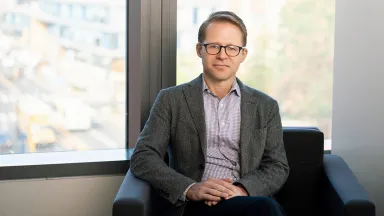
Better Know A LeBow Staff Member: Alison Young Helps Leaders Change People's Lives
For as long as there have been fourth graders and social studies teachers, there have been lesson plans on how a bill becomes a law. Since 1975, those lessons have included a three-minute animated video featuring a singing piece of legislation dancing its way around Capitol Hill.
Informative? Sure. Inspiring? It certainly was for 10-year-old Alison Young, who decided then and there she wanted a career in Washington, D.C.
“I realized that if you wanted to change people’s lives, you had to be involved in changing the process,” Young recalls. “And that meant going to the source in Washington, D.C.”
Seven years later, Young graduated high school and left her upstate New York home for Pennsylvania’s Grove City College, attracted by its strong internship program in Washington. She went to Capitol Hill and opened the mail and answered telephones for then-U.S. Rep. Phil English and then became a staffer for the House Ways and Means Committee. She jumped to a private-sector think tank to help pay for graduate school at George Washington University before joining the administration of President George W. Bush, where she served as the president’s chief advisor on issues that included enhancing the capacity of the nation’s nonprofit sector and creating a culture of service and civic engagement in America.
She learned a great deal about politics and her unique international leadership experiences with the Vancouver Olympic Organizing Committee and multiple NGOs rounded out Young’s knowledge about what it takes to be an effective leader, lessons she is applying to her new role as executive director of Drexel LeBow’s Institute for Strategic Leadership. Those lessons include: know what you are good at; surround yourself with the expertise you do not have; connect with people emotionally; maintain stability; be courageous. She compares leadership to playing three-dimensional chess, facing distinct challenges on separate issues that eventually come together to determine failure or success.
“Great politicians – great leaders in any field – know how to get things done,” Young says. “Too many leaders know what they want to do but lack the ability to persuasively advocate for it and actually implement it by getting people to believe in their cause.”
Jonathan Ziegert, Ph.D., the academic director of the Institute for Strategic Leadership, praises Young as someone who “knows the importance of both thinking and doing with regard to leadership. Based on her background and experiences, she knows what works in the private, public and nonprofit sectors.”
Drexel LeBow’s Institute for Strategic Leadership is distinctive among U.S. universities in combining the study of leadership with an examination of collaboration, viewing leadership as a collective, not solely individual, process. Young plans to make the Institute a best-in-class program known for important conversations on leadership. Faculty fellows affiliated with the Institute focus their research on topics including shared leadership, work-life balance, organizational culture, managerial hypocrisy, team processes and group dynamics.
“All leaders face conflicting reports, analyses and recommendations,” Young says. “The information is always incomplete. Good leaders surround themselves with the best, have principles to guide them, and have the courage to act in the absence of perfect information.”
As for her career in government service, having reached the White House staff two decades earlier than she planned, Young is now enjoying “the diversity of views” she finds at Drexel and the institution’s commitment to relevance. “We get that we have a big role to play,” she says. “Drexel’s reach means we have an opportunity to impact this region and the world. That’s energizing.”
As for her politics, she can be decidedly bi-partisan: she recently married Philadelphian David Maser, a Democrat; but he agreed she could name their dog, Reagan, after her favorite leader.



